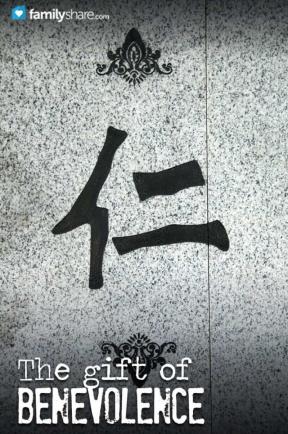
Benevolence is a word we don't often use today. Nonetheless, it's a timeless principle. Confucius taught benevolence as the central idea of his philosophy, and the Chinese character for benevolence is a combination of the signs "people" and "two," signifying how people should treat one another. The Savior Jesus Christ exemplified benevolence in his every waking minute from dining with so-called sinners to healing the blind and lame. Benevolence is a disposition to do good; a generous act of goodwill, kind-heartedness or sympathy. It is a gift or act of charity with no expectation of repayment. What does benevolence look like in daily life?
Between husband and wife
The Christian apostle Paul admonishes, let the husband render unto the wife due benevolence; and likewise also the wife unto the husband. Every day benevolence can look like a heartfelt apology. Be the first to offer it. Don't take offense if he speaks using a different love language than you. Don't say "I told you so." Allow each other the space to make mistakes and forgive quickly when they occur. A wise man told his wife on their wedding day, "It takes two to argue. I promise I will not be one of them."� Benevolence is a desire to make your spouse feel happy and loved.
In the family
Eleven-year-old Jameson was saving for a special toy but did not have enough money to buy it. Hearing his plight, 8-year-old Sarah offered all of her money so her brother could have what he wanted. Children are often examples of benevolence. When they see someone hungry, they share their sandwich. If someone is cold, they offer a blanket. When someone is hurting, they give hugs. As an adult, it is taking care of an aging parent. Delivering the forgotten book report to your son's classroom. Hand washing mom's china because she likes it done that way. Welcoming the in-laws' unannounced visits. Benevolence is being selfless and choosing to put the desires and needs of family members before our own.
In the community
Outside the Gate Beautiful in Jerusalem a beggar entreated the Christian apostles Peter and John for alms. They answered him, "what I have I give unto thee."� They did not give money. Instead, healing was given to this crippled man. Benevolence is giving what you have. It's donating to the local church's rummage sale. Maintaining a well-kept yard and cleaning up a neighbor's if they have difficulty doing so. You could collect canned food for the food bank. Volunteer at a school or family shelter. Support the local fire and police at their annual banquets. Buy some Girl Scout cookies. Coach the recreational soccer team. Visit nursing homes or long-term care facilities simply to offer friendship and listen to a lonely soul. Benevolence is taking the opportunity to do good.
In the workplace
In ancient Israel, debtors were forgiven of the debts and the poor taken in with strangers. What a welcome gift in the lawsuit-loving world of ours. Benevolence in the workplace could mean lending a hand on a project that is outside of your work requirements. Sharing a lunch with a colleague that seems overwhelmed or alone. Withholding judgment on someone who is less competent. Accepting constructive criticism. Being the first to stick up for someone and the last to add fuel to the fire of gossip. Benevolence is being happy for the success of others.
The benefits of benevolence
Benevolence yields benefits, not in dollars and cents but in the heart. The poet Robert Burns describes it thus: "But deep this truth impress'd my mind: Thro' all his works abroad, The heart benevolent and kind The most resembles God."� In addition to our heart becoming like God's through acts of benevolence, a feeling of inner peace and outward love is felt. The Chinese ideogram for benevolence, called "ren,"� means the good feeling a virtuous human experiences when being altruistic. Imagine how you'd feel, how your family, community or workplace would feel, if you were benevolent at least one time each day. Imagine how peace throughout the world could progress if leaders acted in benevolence toward their subjects and nations toward one another. Whether to a spouse or family member, in the community or workplace, give the gift of benevolence today.
"Every man must decide whether he will walk in the light of creative altruism or in the darkness of destructive selfishness."� - Martin Luther King, Jr.

